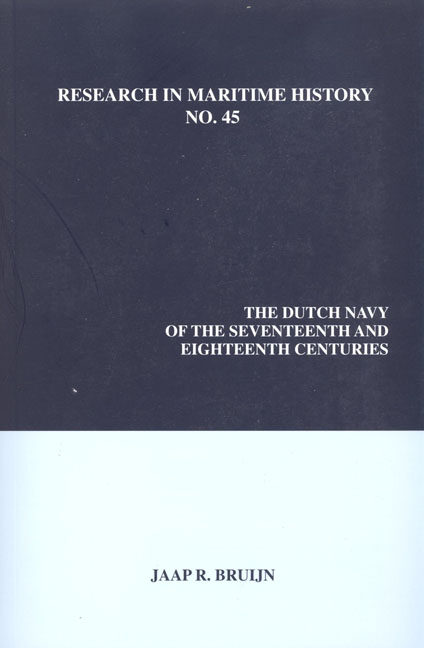Book contents
- Frontmatter
- Contents
- Illustrations
- Tables
- Series Editor's Foreword
- About the Author
- Introduction to the 2011 Edition
- Foreword
- Preface
- Introduction
- Map of the Dutch Republic
- Map of Dutch Naval Activity in European Waters
- Part One The “Old” Navy, Late 1500s-1652
- Part Two The “New” Navy, 1652-1713
- Part Three A Second-Rate Navy, 1714-1795
- In Retrospect
- Bibliography
- Index
Foreword
- Frontmatter
- Contents
- Illustrations
- Tables
- Series Editor's Foreword
- About the Author
- Introduction to the 2011 Edition
- Foreword
- Preface
- Introduction
- Map of the Dutch Republic
- Map of Dutch Naval Activity in European Waters
- Part One The “Old” Navy, Late 1500s-1652
- Part Two The “New” Navy, 1652-1713
- Part Three A Second-Rate Navy, 1714-1795
- In Retrospect
- Bibliography
- Index
Summary
The United Provinces of the Netherlands dominated Western civilization in nearly every major respect throughout most of the seventeenth century and played a key role in shaping the modern world. Politically, the seven Protestant Dutch provinces won their freedom from Catholic Spain in the late sixteenth century to forge a middle-class republic devoted to democracy. As the English diplomat Sir William Temple observed of the Dutch around 1670, “Men live together like Citizens of the World, associated by the common ties of Humanity, and by the bonds of Peace, under the impartial protection of indifferent laws, with equal encouragement of all Art and Industry and equal freedom of Speculation and Enquiry.” Economically, this industry was manifested in a dynamic mercantile trade that quickly made the Netherlands the first modern nation-state rooted in bourgeois capitalism. Culturally, free thought and high achievement in art - direct successors to intellectual and creative forces in Italy during the preceding three centuries - established the Dutch Renaissance.
Dutch hegemony in Europe and the distant seas was made possible by fortuitous historical timing and strategic insularity. Not only were the Netherlands isolated by the natural water barriers of the North Sea, the estuaries and the Maas, Rhine, Waal and Lek rivers to the south, but the Republic had little to fear from the fragmented German principalities to the east, the internally preoccupied countries of France and England, and an enfeebled Spanish Netherlands (modern Belgium) beyond the river barriers. Thus could a nation of fewer than two million people take to the seas with enough merchant ships - almost 2000 at the peak - to capture the maritime trade of virtually all Europe and with the most formidable navy of the era to protect the concomitant prosperity.
It was the Dutch Republic that provided the precedent of a democratic, freeenterprise maritime empire which would eventually be emulated by Great Britain in the eighteenth and nineteenth centuries and the United States in the twentieth century. The great Dutch jurist Hugo Grotius first articulated the principle of freedom of the seas (Mare Liberum) in 1609, laying the foundations of modern international law and justifying the policy of the Dutch East India Company to shatter and replace the Portuguese trading monopoly over the Indian Ocean and Southeast Asia.
- Type
- Chapter
- Information
- The Dutch Navy of the Seventeenth and Eighteenth Centuries , pp. xxiii - xxivPublisher: Liverpool University PressPrint publication year: 2011

